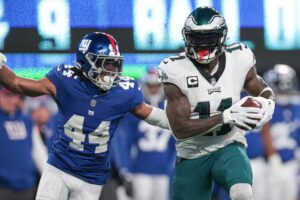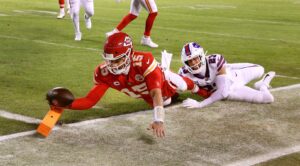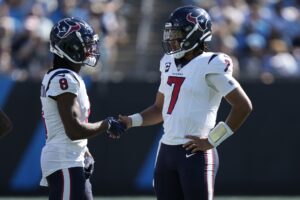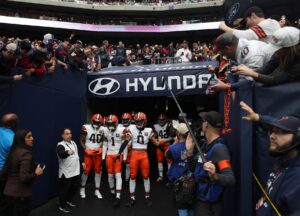Nearly 17 years after his final game as Minnesota Vikings head coach, Dennis Green will be inducted into the team’s Ring of Honor. During halftime of their September 23 tilt against the Buffalo Bills, Green will become the 24th member of the team’s elite club. Green spent 10 seasons with the Vikings, posting a 97-62 record before resigning ahead of the team’s final game of the 2001 season. His 97 wins are second all-time in team history, behind only Bud Grant.
While criticized by fans and media throughout his tenure, he was known as a players’ coach, taking castoffs from other teams and either resurrecting or kickstarting careers for countless players. Most notable of these were star wide receivers Cris Carter and Randy Moss. Even though he was unable to take some talented rosters to the Super Bowl, Green’s accomplishments are undeniable. His final season in 2001 was the team’s only losing season under him as the team claimed four NFC Central Division titles.
Dennis Green: A Deserving Addition to the Minnesota Vikings Ring of Honor
Building a Winning Culture
Following three seasons as the head coach at Stanford University, Green became the fifth head coach in Vikings history in 1992. The team had missed the playoffs two consecutive seasons and was feeling the effects of the failed Herschel Walker trade. Minnesota went 11-5 in Green’s first season, the first of three consecutive and eight of the next nine post-season trips.
Despite consistently great skill-position players such as Carter, Terry Allen, Jake Reed, and Robert Smith, Green was able to orchestrate offenses with a revolving door at quarterback. Rich Gannon, Jim McMahon, Brad Johnson, and Warren Moon were among those at the helm during the first half of Green’s tenure. Although the team had relative success with short-term answers at the game’s most important position, Green’s teams had quick playoff exits, losing in the wild-card round in each of their first four post-season trips. The team would finally win a playoff game in 1997 against the New York Giants in the wild card round but got bounced the following week 38-22 against the San Fransisco 49ers.
A New Era is Born
Fans were yearning for a spark. An older generation was struggling to fill the Metrodome on a consistent basis and even the star players were starting to get older. Two moves changed team history. One was Red McCombs purchasing the team prior to the 1998 season for $250 million. The next was Green taking a chance on the talented yet troubled Moss in the draft. After 19 different teams passed on Moss, the product of Marshall played with a chip on his shoulder. He set a rookie record with 17 touchdown receptions, leading the way on a Randall Cunningham-ran offense that scored a then-record 556 points en route to a 15-1 record.
Fan enthusiasm was through the roof. Between the offensive juggernaut and McCombs selling fans on “Purple Pride,” young fans across the state and nation fell in love with the team of castoffs that Green had built. The defense was led by undersized defensive tackle John Randle, and even though it wasn’t as strong as the offense, the defense was talented and opportunistic. Minnesota looked destined to represent the NFC in Super Bowl XXXIII. That is, until the Atlanta Falcons came to town.
A Golden Chance Missed
After years of early playoff exits, the Vikings finally had home-field advantage throughout the 1998 playoffs. After dismantling the Arizona Cardinals in the divisional round, Minnesota hosted the Falcons in the NFC Championship Game. For most of the first half, the Vikings dominated. A strip-sack of Cunningham right before halftime set up a Falcons touchdown, closing Minnesota’s lead to 20-14.
Green and the Vikings came out much more conservative in the second half and never had the edge they played with the first 17 1/2 games of the season. Despite injuries to key starters, the Vikings appeared ready to seal the game late in the fourth quarter up 27-20. After becoming the first kicker in NFL history to not miss a kick all season, veteran Gary Anderson missed a 38-yard field goal, and the Falcons responded with a touchdown to tie the game.
With all three timeouts left at their own 20-yard line, the Vikings managed to pick up a seven-yard scramble that burned a timeout and an incompletion. On third-down, though, with the NFL’s most electric offense of all-time, Green elected to have Cunningham take a knee and play for overtime. A Morten Anderson field goal from 38 yards would send the Falcons to the Super Bowl. The Vikings had squandered their best chance to win a Super Bowl in two decades.
The following two seasons saw Jeff George and the young first-round draft pick Daunte Culpepper take the reins of the Vikings offense. As much as the two helped light up the Metrodome scoreboard, the magic of 1998 was gone. The team lost in the divisional round in the 1999 playoffs and was embarrassed 41-0 in the 2000 NFC Championship Game against the Giants. Cornerstones of Green’s teams such as Smith and Randle were gone in the off-season, and the team’s identity was changing. No one could prepare for what would come next.
An Unceremonious Finale
During a hot training camp practice on July 31, 2001 that saw heat indexes reach 110 degrees, long-time right tackle Korey Stringer began vomiting. After practice, he complained of dizziness and began breathing heavy. He was rushed to a hospital, and died at 1:50 AM from heat stroke.
Stringer was very popular among teammates and coaches, and the team was never able to recover from an 0-2 start. Culpepper was injured throughout the season, Carter was nearing the end of his career, and nothing that was clicking during Green’s tenure was clicking in 2001. After going 5-10, Green resigned before the team’s final game. Although he had the second-most wins in Vikings history, critics pointed at his 4-8 playoff record and felt ultimately underwhelmed.
The Last Word on Dennis Green
Many will remember Green for his epic post-game rant as Cardinals head coach in 2006. But he was a successful, innovative coach who made troubled and undeveloped players into starters and key role players. Hall of Fame head coach Tony Dungy was the Vikings defensive coordinator from 1992-95 and said Green would give him tips while other teams contacted Dungy about their head coaching vacancies.
Even after his NFL days, Green was on the sidelines. With the UFL’s Sacramento Mountain Lions, he was paid $1 million to coach in 2010 and he was set to get paid $1.5 million in 2011. He only saw $510,000 of that, suing the team. But he still finished coaching the 2011 season, saying in 2016 that, “Athletes and coaches don’t quit.” His legacy stretched far beyond the football field, and fans should be proud that the Wilf family is recognizing and honoring it.






